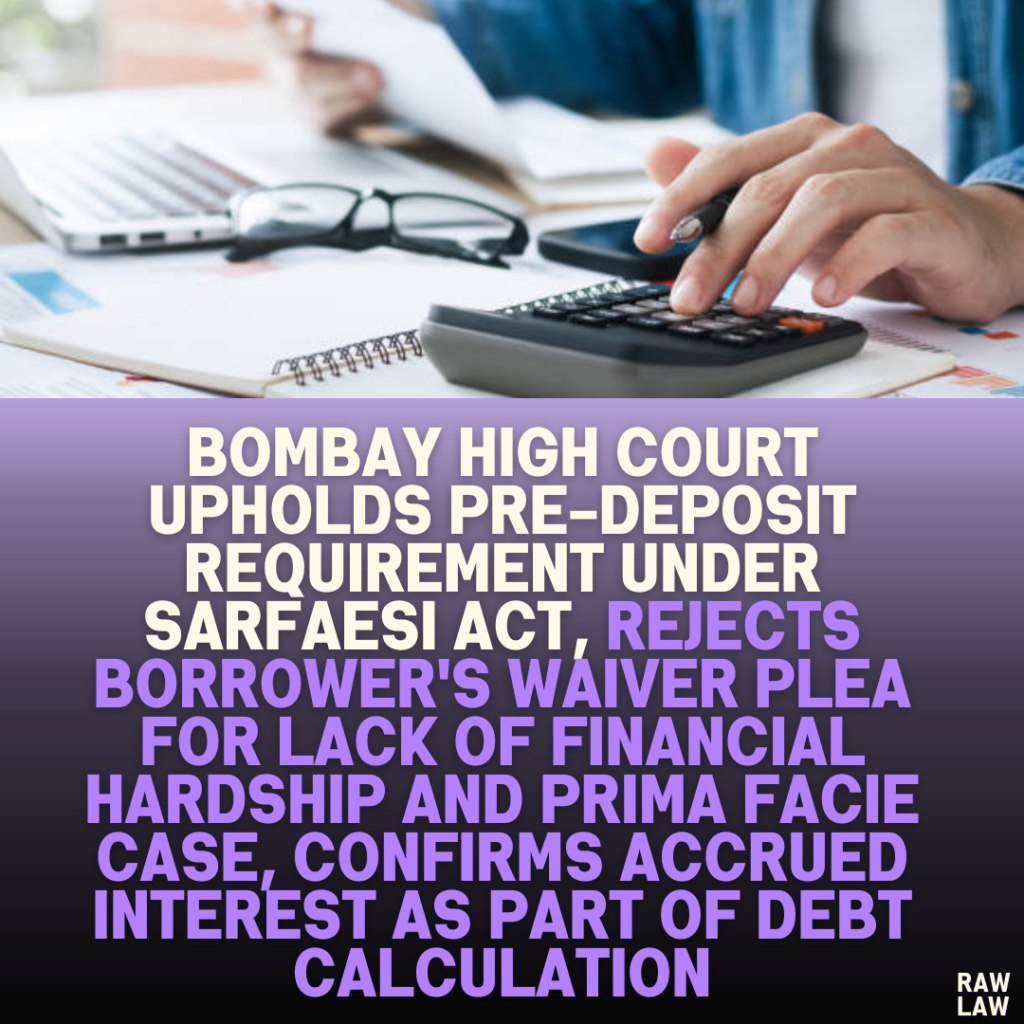1. Court’s Decision:
The Bombay High Court rejected the borrower’s writ petition seeking a waiver of the statutory pre-deposit required under Section 18(1) of the SARFAESI Act to appeal a DRAT order. The court also disposed of ARCL’s related petitions, holding that the interest accrued on the debt must be included when calculating the debt due. It upheld the dismissal of the borrower’s appeal by DRAT for non-compliance with the pre-deposit condition.
2. Facts:
- The borrower’s loan account was classified as a Non-Performing Asset (NPA) on May 4, 2021. However, a later assignment deed incorrectly listed the date as July 5, 2022. This error was later rectified.
- The borrower received a notice under Section 13(2) of the SARFAESI Act in May 2021 for default on loan repayments.
- DRAT had directed the borrower to pre-deposit 50% of the debt due, as per the SARFAESI Act. The borrower sought a waiver, arguing financial hardship and discrepancies in ARCL’s debt calculations.
- ARCL contested, stating the borrower failed to establish financial hardship and that accrued interest must be included in the debt calculations.
3. Issues:
- Whether the borrower demonstrated sufficient grounds for a waiver of the pre-deposit requirement under Section 18(1) of the SARFAESI Act.
- Whether the debt calculation by DRAT, excluding accrued interest, complied with the SARFAESI Act.
4. Petitioner’s (Borrower’s) Arguments:
- Discrepancy in NPA Classification: The borrower pointed to conflicting dates for their NPA status (May 4, 2021, and July 5, 2022) as evidence of procedural irregularity.
- Financial Hardship: They argued that requiring a 50% pre-deposit caused undue hardship and cited financial losses during the COVID-19 pandemic, though they admitted they lacked supporting documents.
- Debt Calculation: Alleged discrepancies in ARCL’s debt calculation, claiming that some payments made were not accounted for in determining the total debt.
5. Respondent’s (ARCL’s) Arguments:
- NPA Status: ARCL clarified that the discrepancy in the assignment deed was a typographical error, corrected via a supplemental rectification deed. They emphasized the borrower’s failure to show that their account was not an NPA as of May 4, 2021.
- Financial Hardship: ARCL argued that the borrower did not provide sufficient evidence of financial distress, failing to present documents like balance sheets or tax audits.
- Debt Calculation: ARCL argued that all payments were accounted for in line with the loan agreement and that accrued interest must be included when calculating the debt due.
6. Analysis of the Law:
- Section 18 of SARFAESI Act: Requires borrowers to pre-deposit 50% of the debt due (with a minimum of 25% allowed at the discretion of DRAT) to file an appeal.
- Precedents:
- Sterlite Technologies Ltd.: Courts must evaluate a prima facie case and financial hardship before granting waivers.
- Sony Mony Developers Pvt. Ltd.: Debt includes accrued interest up to the appeal date.
The court emphasized that financial hardship alone does not justify waiving the pre-deposit requirement; a prima facie case must also be established.
7. Precedent Analysis:
- Sterlite Technologies Ltd. emphasized that DRAT must consider prima facie merit in the case and record reasons for granting waivers.
- Sony Mony Developers Pvt. Ltd. and MRB Roadconst Pvt. Ltd. clarified that debt calculations under SARFAESI include accrued interest until the appeal filing date.
8. Court’s Reasoning:
- Financial Hardship: The borrower’s claim was unsupported by sufficient evidence, such as balance sheets or detailed financial records. The COVID-19 argument was dismissed as it was neither pleaded before the DRAT nor supported with documentation.
- Prima Facie Case: The court rejected the claim of procedural irregularities regarding the NPA classification, holding that the discrepancy was an inadvertent clerical error rectified by ARCL. The borrower failed to prove that their account should not have been classified as NPA.
- Debt Calculation: The court reaffirmed that accrued interest forms part of the debt due and faulted DRAT’s failure to include this in its calculations.
9. Conclusion:
- The borrower failed to establish a prima facie case or financial hardship warranting waiver of the pre-deposit.
- The DRAT’s order dismissing the borrower’s appeal for non-compliance with the pre-deposit requirement was upheld.
- The court disposed of ARCL’s petitions with directions for including accrued interest in debt calculations for future cases.
10. Implications:
- This judgment reinforces strict compliance with SARFAESI requirements, emphasizing that procedural discrepancies or typographical errors will not derail debt recovery processes.
- Borrowers must substantiate claims of financial hardship with concrete evidence, and creditors must ensure accurate documentation to avoid unnecessary disputes.
